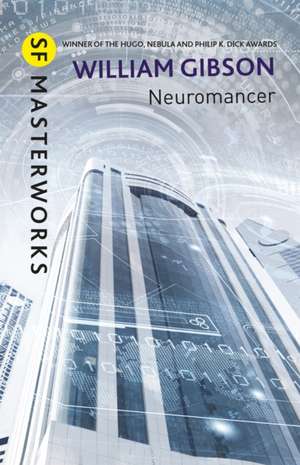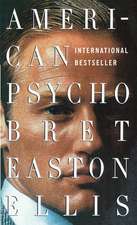Neuromancer : S.F. Masterworks
Autor William Gibsonen Limba Engleză Hardback – 11 mai 2017
The book that defined the cyberpunk movement, inspiring everything from The Matrix to Cyberpunk 2077.
The sky above the port was the color of television, tuned to a dead channel.
William Gibson revolutionised science fiction in his 1984 debut Neuromancer. The writer who gave us the matrix and coined the term 'cyberspace' produced a first novel that won the Hugo, Nebula and Philip K. Dick Awards, and lit the fuse on the Cyberpunk movement.
More than three decades later, Gibson's text is as stylish as ever, his noir narrative still glitters like chrome in the shadows and his depictions of the rise and abuse of corporate power look more prescient every day. Part thriller, part warning, Neuromancer is a timeless classic of modern SF and one of the 20th century's most potent and compelling visions of the future.
| Toate formatele și edițiile | Preț | Express |
|---|---|---|
| Paperback (3) | 49.68 lei 3-5 săpt. | +26.34 lei 7-13 zile |
| Orion Publishing Group – 24 noi 2022 | 49.68 lei 3-5 săpt. | +26.34 lei 7-13 zile |
| Penguin Books – 31 dec 2002 | 57.29 lei 3-5 săpt. | +6.68 lei 7-13 zile |
| Ace Books – 30 iun 2000 | 103.53 lei 3-5 săpt. | |
| Hardback (2) | 73.59 lei 3-5 săpt. | +37.95 lei 7-13 zile |
| Orion Publishing Group – 11 mai 2017 | 73.59 lei 3-5 săpt. | +37.95 lei 7-13 zile |
| Penguin Books – 25 oct 2016 | 153.45 lei 3-5 săpt. | +37.77 lei 7-13 zile |
Din seria S.F. Masterworks
- 23%
 Preț: 48.76 lei
Preț: 48.76 lei - 22%
 Preț: 65.90 lei
Preț: 65.90 lei - 23%
 Preț: 53.68 lei
Preț: 53.68 lei - 24%
 Preț: 71.75 lei
Preț: 71.75 lei - 23%
 Preț: 49.19 lei
Preț: 49.19 lei - 25%
 Preț: 42.74 lei
Preț: 42.74 lei - 22%
 Preț: 65.84 lei
Preț: 65.84 lei - 23%
 Preț: 53.78 lei
Preț: 53.78 lei - 25%
 Preț: 42.78 lei
Preț: 42.78 lei - 24%
 Preț: 48.13 lei
Preț: 48.13 lei - 23%
 Preț: 49.42 lei
Preț: 49.42 lei - 21%
 Preț: 66.65 lei
Preț: 66.65 lei - 23%
 Preț: 48.81 lei
Preț: 48.81 lei - 23%
 Preț: 49.13 lei
Preț: 49.13 lei - 24%
 Preț: 48.29 lei
Preț: 48.29 lei - 23%
 Preț: 73.75 lei
Preț: 73.75 lei - 23%
 Preț: 74.30 lei
Preț: 74.30 lei - 23%
 Preț: 49.64 lei
Preț: 49.64 lei - 20%
 Preț: 69.39 lei
Preț: 69.39 lei - 23%
 Preț: 64.26 lei
Preț: 64.26 lei - 23%
 Preț: 48.81 lei
Preț: 48.81 lei - 23%
 Preț: 54.00 lei
Preț: 54.00 lei - 24%
 Preț: 47.93 lei
Preț: 47.93 lei - 24%
 Preț: 43.33 lei
Preț: 43.33 lei - 21%
 Preț: 67.73 lei
Preț: 67.73 lei - 22%
 Preț: 49.98 lei
Preț: 49.98 lei - 24%
 Preț: 53.53 lei
Preț: 53.53 lei - 24%
 Preț: 43.34 lei
Preț: 43.34 lei - 22%
 Preț: 65.16 lei
Preț: 65.16 lei - 25%
 Preț: 42.14 lei
Preț: 42.14 lei - 24%
 Preț: 47.72 lei
Preț: 47.72 lei - 23%
 Preț: 48.78 lei
Preț: 48.78 lei - 25%
 Preț: 42.48 lei
Preț: 42.48 lei - 24%
 Preț: 48.70 lei
Preț: 48.70 lei - 23%
 Preț: 49.10 lei
Preț: 49.10 lei - 22%
 Preț: 49.98 lei
Preț: 49.98 lei - 23%
 Preț: 54.25 lei
Preț: 54.25 lei - 24%
 Preț: 43.59 lei
Preț: 43.59 lei - 23%
 Preț: 54.06 lei
Preț: 54.06 lei - 24%
 Preț: 47.94 lei
Preț: 47.94 lei - 24%
 Preț: 48.25 lei
Preț: 48.25 lei - 23%
 Preț: 74.38 lei
Preț: 74.38 lei - 21%
 Preț: 66.43 lei
Preț: 66.43 lei - 25%
 Preț: 42.78 lei
Preț: 42.78 lei -
 Preț: 64.05 lei
Preț: 64.05 lei - 25%
 Preț: 42.74 lei
Preț: 42.74 lei - 24%
 Preț: 48.15 lei
Preț: 48.15 lei - 24%
 Preț: 47.75 lei
Preț: 47.75 lei - 24%
 Preț: 48.54 lei
Preț: 48.54 lei
Preț: 73.59 lei
Preț vechi: 95.84 lei
-23% Nou
14.08€ • 14.70$ • 11.65£
Carte disponibilă
Livrare economică 15-29 martie
Livrare express 01-07 martie pentru 47.94 lei
Specificații
ISBN-10: 1473217377
Pagini: 297
Dimensiuni: 140 x 197 x 30 mm
Greutate: 0.38 kg
Editura: Orion Publishing Group
Colecția Gollancz
Seria S.F. Masterworks
Notă biografică
William Gibson's website is www.williamgibsonbooks.com and you can follow him on Twitter at @greatdismal
Extras
The sky above the port was the color of television, tuned to a dead channel.
“It’s not like I’m using,” Case heard someone say, as he shouldered his way through the crowd around the door of the Chat. “It’s like my body’s developed this massive drug deficiency.” It was a Sprawl voice and a Sprawl joke. The Chatsubo was a bar for professional expatriates; you could drink there for a week and never hear two words in Japanese.
Ratz was tending bar, h is prosthetic arm jerking monotonously as he filled a tray of glasses with draft Kirin. He saw Case and smiled, his teeth a webwork of East European steel and brown decay. Case found a place at the bar, between the unlikely tan on one of Lonny Zone’s whores and the crisp naval uniform of a tall African whose cheekbones were ridged with precise rows of tribal scars. “Wage was in her early, with two joeboys,” Ratz said, shoving a draft across the bar with his good hand. “Maybe some business with you, Case?”
Case shrugged. The girl to his right giggled and nudged him.
The bartender’s smile widened. His ugliness was the stuff of legend. In an age of affordable beauty, there was something heraldic about his lack of it. The antique arm whined as he reached for another mug. It was a Russian military prosthesis, a seven-function force-feedback manipulator, cased in grubby pink plastic. “You are too much the artiste, Herr Case.” Ratz grunted; the sound served him as laughter. He scratched his overhang of white-shirted belly with the pink claw. “You are the artiste of the slightly funny deal.”
“Sure,” Case said, and sipped his beer. “Somebody’s gotta be funny around here. Sure the fuck isn’t you.”
The whore’s giggle went up an octave.
“Isn’t you either, sister. So you vanish, okay? Zone, he’s a close personal friend of mine.”
She looked Case in the eye and made the softest possible spitting sound, her lips barely moving. But she left.
“Jesus,” Case said, “what kinda creepjoint you running here? Man can’t have a drink?”
“Ha,” Ratz said, swabbing the scarred wood with a rag, “Zone shows a percentage. You I let work here for entertainment value.”
As Case was picking up his beer, one of those strange instants of silence descended, as though a hundred unrelated conversations had simultaneously arrived at the same pause. Then the whore’s giggle rang out, tinged with certain hysteria.
Ratz grunted. “An angel has passed.”
“The Chinese,” bellowed a drunken Australian, “Chinese bloody invented nerve-splicing. Give me the mainland for a nerve job any day. Fix you right, mate…;”
“Now that,” Case said to his glass, all his bitterness suddenly rising in him like bile, “that is so much bullshit.”
The Japanese had already forgotten more neurosurgery than the Chinese had ever known. The black clinics of Chiba were the cutting edge, whole bodies of technique supplanted monthly, and still they couldn’t repair the damage he’d suffered in that Memphis hotel.
A year here and he still dreamed of cyberspace, hope fading nightly. All the speed he took, all the turns he’d taken and the corners he’d cut in Night City, and still he’d see the matrix in his sleep, bright lattices of logic unfolding across that colorless void…;The Sprawl was a long strange way home over the Pacific now, and he was no console man, no cyberspace cowboy. Just another hustler, trying to make it through. But the dreams came on in the Japanese night like livewire voodoo, and he’d cry for it, cry in his sleep, and wake alone in the dark, curled in his capsule in some coffin hotel, his hands clawed into the bedslab, temperfoam bunched between his fingers, trying to reach the console that wasn’t there.
“I saw your girl last night,” Ratz said, passing Case his second Kirin.
“I don’t have one,” he said, and drank.
“Miss Linda Lee.”
Case shook his head.
“No girl? Nothing? Only biz, friend artiste? Dedication to commerce?” The bartender’s small brown eyes were nested deep in wrinkled flesh. “I think I liked you better, with her. You laughed more. Now, some night, you get maybe too artistic; you wind up in the clinic tanks, spare parts.”
“You’re breaking my heart, Ratz.” He finished his beer, paid and left, high narrow shoulders hunched beneath the rainstained khaki nylon of his windbreaker. Threading his way through the Ninsei crowds, he could smell his own stale sweat.
Case was twenty-four. At twenty-two, he’d been a cowboy, a rustler, one of the best in the Sprawl. He’d been trained by the best, by McCoy Pauley and Bobby Quine, legends in the biz. He’d operated on an almost permanent adrenaline high, a byproduct of youth and proficiency, jacked into a custom cyberspace deck hat projected his disembodied consciousness into the consensual hallucination that was the matrix. A their, he’d worked for other, wealthier thieves, employers who provided the exotic software required to penetrate the bright walls of corporate systems, opening windows into rich fields of data.
He’s made the classic mistake, the one he’s sworn he’d never make. He stole from his employers. He kept something for himself and tried to move it through a fence in Amsterdam. He still wasn’t sure how he’d been discovered, not that it mattered now. He’d expected to die, then but they only smiled. Of course he was welcome, they told him, welcome to the money. And he was going to need it. Becauseߝߝstill smilingߝߝthey were going to make sure he never worked again.
They damaged his nervous system with a wartime Russian mycotoxin.
Strapped to a bed in a Memphis hotel, his talent burning out micron by micron, he hallucinated for thirty hours.
The damage was minute, subtle, and utterly effective.
For Case, who’d lived for the bodiless exultation of cyberspace, it was the Fall. In the bars he’d frequented as a cowboy hotshot, the elite stance involved a certain relaxed contempt for the flesh. The body was meat. Case fell into the prison of his own flesh.
His total assets were quickly converted to New Yen, a fat sheaf of the old paper currency that circulated endlessly through the closed circuit of the world’s black markets like the seashells of the Trobriand islanders. It was difficult to transact legitimate business with cash in the Sprawl; in Japan, it was already illegal.
In Japan, he’d known with a clenched and absolute certainty, he’d find his cure. In Chiba. Either in a registered clinic or in the shadowland of black medicine. Synonymous with implants, nerve-splicing, and microbionics, Chiba was a magnet for the Sprawl’s techno-criminal subcultures.
In Chiba, he’d watched his New Yen vanish in a two-month round of examinations and consultations. The men in the black clinics, his last hope, had admired the expertise with which he’d been maimed, and then slowly shaken their heads.
Now he slept in the cheapest coffins, the ones nearest the port, beneath the quartz-halogen floods that lit the docks all night like vast stages; where you couldn’t see the lights of Tokyo for the glare of the television sky, not even the towering hologram logo of the Fuji Electric Company, and the Tokyo Bay was a black expanse where gulls wheeled above drifting shoals of white styrofoam. Behind the port lay the city, factory domes dominated by the vast cubes of corporate arcologies. Port and city were divided by a narrow borderland of older streets, an area with no official name. Night City, with Ninsei its heart. By day, the bars down Ninsei were shuttered and featureless, the neon dead, the holograms inert, waiting, under the poisoned silver sky.
--Reprinted from Neuromancer by William Gibson by permission of Berkley, a member of Penguin Putnam Inc. Copyright © 1984, William Gibson. All rights reserved. This excerpt, or any parts thereof, may not be reproduced in any form without permission.
Recenzii
"Freshly imagined, compellingly detailed, and chilling in its implications." —New York Times
"Kaleidoscopic, picaresque, flashy and decadent...an amazing virtuoso performance." —Washington Post






















